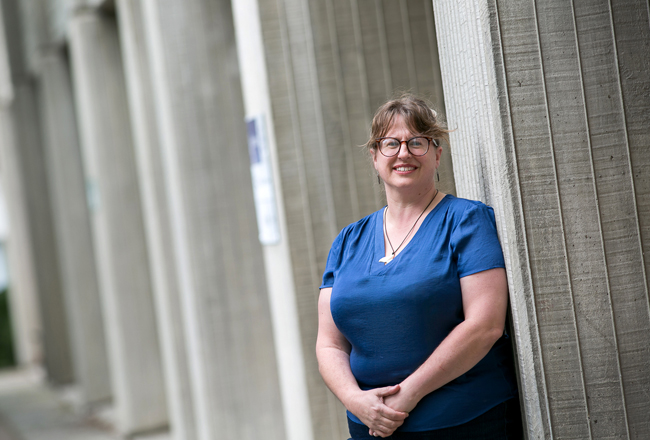 Pauline Dawson, PhD candidate
Pauline Dawson, PhD candidate
Why don't mothers and babies receive the same level of care no matter who they are or where they live? Otago PhD candidate Pauline Dawson knows investigating this question will take her all over New Zealand – she didn't expect a trip to Oxford University, UK, too.
Pauline is a midwife, working at Queen Mary, Dunedin Hospital's maternity ward. She is also an Otago Professional Practice Fellow teaching students clinical skills around pregnancy and childbirth. Her goal to see all women get the same level of care no matter their social status, ethnicity or location has seen her take on PhD studies in Dunedin School of Medicine's Department of Women's & Children's Health, Te Tari Hauora Wāhine me te Tamariki, too.
"The range of the people we have working at the University of Otago is absolutely amazing. Together, the skills you have available in your supervisors can be remarkable."
Pauline says her PhD, 'Investigating barriers to equitable access to maternity care in Aotearoa New Zealand' grew out of questions raised by her Master's investigation into where mothers choose to give birth in New Zealand's Southern District Health Board area.
“Before I began my PhD, I spent 18 months mulling over idea and talking with my colleagues; one of whom, Associate Professor Jean Hay-Smith, is now my main supervisor.
“I have two other supervisors; General Practice and Rural Health's Associate Professor Chrys Jaye, and Professor Robin Gauld, who is Dean and pro-Vice Chancellor of Commerce, (he used to be Head of Social and Preventive Medicine). The range of the people we have working at the University of Otago is absolutely amazing. Together, the skills you have available in your supervisors can be remarkable. The PhD support and guidance from my department and the wider University, has been incredible, too.”
Oxford University trip 'out of the blue
Dr Gauld's connections resulted in Pauline's trip to attend the Wennberg International Collaborative Fall Research Meeting 2017, at Oxford University, UK.
“It was just out of the blue. It was amazing to be talking to people from16 different countries doing academic research and policy work at a really high level. I gained a lot of ideas going forward in my PhD. The networking opportunities were fantastic It's nice to know other health care systems face similar problems, it's not just us.”
Post-PhD, Pauline hopes to work as an academic, but wants to keep some clinical work going, too.
“It keeps you grounded in the work. It keeps me in touch with the women.”